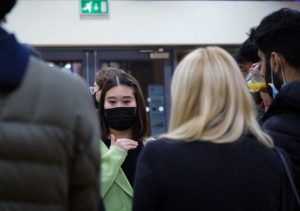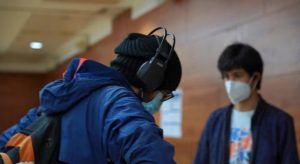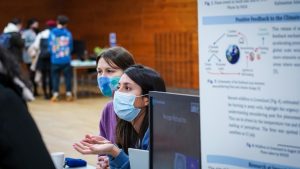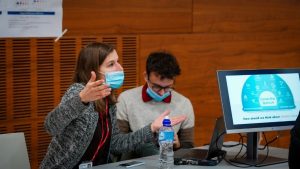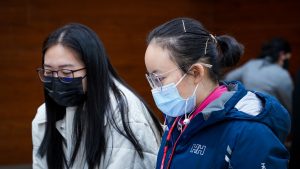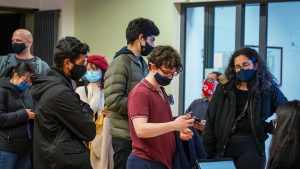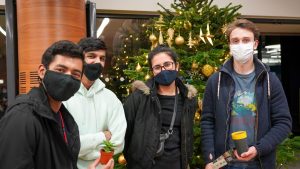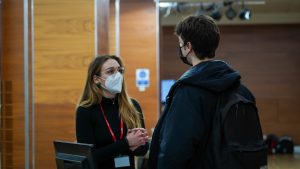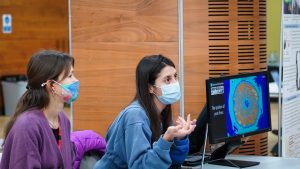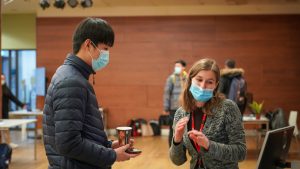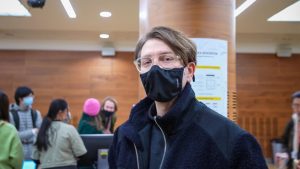In December 2021 PhD students from Imperial’s Centre for Environmental Policy (CEP), Dyson School of Design Engineering (Dyson) and Business School (ICBS), organised an event in response to COP26 and the environmental crisis.
‘Beauty of a More Colourful World’ brought together twelve postgraduate research students from six different departments to showcase how their research ties into addressing environmental problems. In this blog post one of the organisers, Yurong Yu, reflects on the experience.
Author: Yurong Yu | Photo credits: Yunwan Tao.
My fellow co-organiser, Neel Le Penru, and I initiated this event because we realised that the complexity of environmental problems requires interdisciplinary collaboration, so opportunities for interdepartmental communication among researchers is vital. It’s also crucial for junior researchers to learn how to communicate their research to a non-specialist audience, to achieve a greater impact.
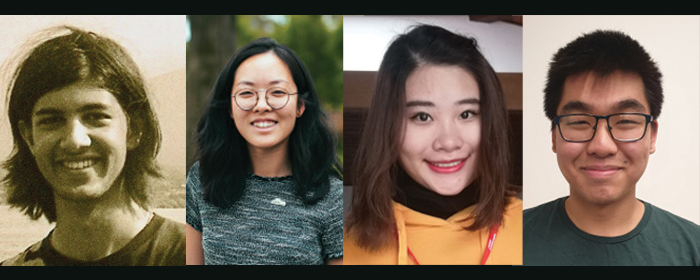
After some discussion we came up with the idea of inviting interactive and entertaining presentations from multiple departments, using different formats such as demos, prototypes, installations and games to inspire members of our Imperial community. The title, Beauty of a more colourful world, not only refers to the colourful environmental system, but also our diverse Imperial research community. The “flash mob” element came about because of the tight timeline – normally an event like this takes months to plan and carry out, but we didn’t want to miss the perfect window created by COP26, so we sped up and made it come true in five weeks!
Getting together
Our cross-departmental initiative aimed to create a unique opportunity to gather researchers and the wider College community with shared interests in climate change and the environment, including conservation, biodiversity and sustainability. We eventually brought together twelve multi-background PhD student presenters to run nine stalls in the Queen’s Tower room.

Engaging the audience
The event was open to everyone. Our audience from across Imperial was encouraged to learn about all nine projects with the incentive of demonstrating their engagement by taking part in quizzes and winning prizes. In fact, the quiz questions were consciously designed to “nudge” the audience to approach presenters and ask more questions about their research.
It was a fun and interactive event which saw high turnout, with about 70 attendees enjoying the stalls, snacks, drinks and, of course, prizes!
A taste of the projects on display
Planting coral reefs in Hainan, China
Yurong and fellow student Yuruo Lin shared a video showing their experience training students to plant coral reefs in Hainan, China, alongside a presentation explaining the whole project, receiving great feedback from the audience. This project is part of Yurong’s PhD research exploring how to increase public awareness of conservation, which can further lead to fundamental behaviour change.
The Bornean rainforest ‘listening station’
Neel’s presentation featured a ‘listening station’ with sounds and images from the Bornean rainforest. His research group explore EcoAcoustic Monitoring, which involves listening to the natural environment’s soundscape to infer metrics of ecosystem health. They designed and deployed a network of low-cost, open-source field recorders to passively and continuously monitor various environments. They then analysed this data with techniques including machine learning (for predicting aspects of ecosystem health) and, more recently, spatial audio analysis (for locating sounds).
As part of the Stability of Altered Forest Ecosystems (SAFE) project, they are specifically using EcoAcoustic Monitoring to explore how human pressures are impacting globally vital rainforest ecosystems by analysing soundscapes across a habitat degredation gradient from primary rainforest to oil palm plantations in Malaysian Borneo.
An insight into Hazelab
Francesca Lugaresi and her colleagues from the Department of Mechanical Engineering are part of Imperial Hazelab, the research group studying heat transfer, combustion and fire science.
Francesca’s research is on improving building façades to increase sustainability performance and reduce energy use.
Understanding how to assess and price climate-related risks
Matilde Faralli is a second-year PhD student from Department of Finance, ICBS. Her research is about preserving financial stability. A key factor in achieving this is to understand how to correctly assess and price climate-related risks. Her work studies: how to incorporate natural hazards, such as wildfires and flooding, into expectations and forecasts; how climate risks shape public perception of future natural disasters and the associated economic damages; and, how to forecast adjustments following climate events.

The value of student-led events like this
I started doing some science communication work in China last year, which made me regret not starting even earlier! It’s rewarding to see that when students come to know more about conservation and climate change, they are often motived to set a future path toward addressing these crises. A non-academic, cross-disciplinary, in-person event such as this provides us, the junior researchers, with a platform outside the lab/office to communicate our work and pass on our passion to a younger generation at Imperial!
More importantly, we get to know other young researchers from a contrasting but relevant discipline, from where innovation might start. Some of the presenters (myself included) have already start talking to each other about future collaboration.
And what did the audience think?
The event received great feedback. Professor Mark Burgman, Director of the CEP, commented: “It’s very well-organised, with impressive attendance across Imperial. I enjoyed these presentations very much.”
Kevin Sum, our volunteer journalist, interviewed attendees on the day, and heard from Xilan, an MSc student from the Department of Civil and Environmental Engineering, that the event made her realise there are so many disciplines at Imperial that are environment-related, and that they are all so fun!
Our presenters found engaging with the audience a really positive experience too. Sander Valk (Dyson) was happy to see so many students and faculty members interested in learning his climate change related card game. Victoria Hoare (CEP), Riqi Zhang (CEP), Karina Corada Perez (CEP), Erika Piroli (CEP) and Ric Zhang (Dyson) all found that the informal format worked well: Sander said, “I loved it!”
Take the quiz again!
Hover your phone camera over each QR code below to get taken to the quiz questions – you can only get every question correct if you listen to all presentations. Give it go!

Find out more
Read more about all the presentations and check out more photos from the event in our picture gallery below! Many thanks to our photographer Yunwan Tao.
